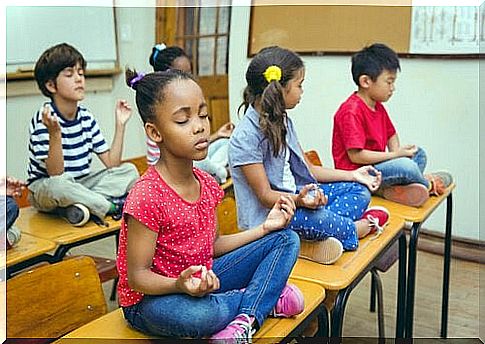The Benefits Of Meditation In The Classroom

Young children do not feel overwhelmed by so many prejudices, barriers or preconceived ideas, which gives them an advantage when it comes time to practice meditation. Furthermore, this practice, conducted in the school environment, has numerous advantages for pupils.
For this reason, in this article we will find out what are the benefits of meditation in the classroom.
First, it must be taken into account that meditation is both a mental and physical exercise. Pupils who undergo the required effort and practice full mental awareness in the classroom reap the countless long and short term benefits that come with it.
Meditation can play an important role as part of regular teaching. It not only allows students to improve their self-awareness, but also to change their point of view to some extent.
In fact, the practice of meditation requires a certain commitment: it consists in dedicating at least 10 minutes to it every day and finding a small space to sit or stop comfortably.
Furthermore, it must be remembered that meditation is not reserved exclusively for adults. Even children and adolescents can take advantage of all the benefits that come with it. Research has also shown that meditation in the classroom helps pupils stay calm and focused. It also offers them the opportunity to learn to relax and reflect.
What are the benefits of classroom meditation?
In the following lines, we explain what are the benefits of meditation in the classroom:
1. Greater concentration
Meditation increases the ability to concentrate for prolonged periods of time. Likewise, teach children that it is possible to direct one’s attention. Students derive a large number of benefits from this, including being able to pay attention in the classroom for a longer time and thus improve retention of lesson content.

2. Promotes compassion and self-esteem
Due to pressures and circumstances beyond their control, children sometimes feel that they will fail an exam. In fact, it can be a difficult task, especially when you are being harassed or mistreated by other people.
Fortunately, meditation can strengthen children’s feelings of security, empathy, and inner stability. In turn, this process generates compassion, joy and greater self-esteem among pupils.
3. Improve attention
The third of the benefits of meditation in the classroom is that the practice improves the attention of children and reduces internalization problems, such as fear, lack of integration in social groups, anxiety and depression. In this way, the psychological well-being of children improves, just as confirmed by numerous studies.
4. Reduces Stress
Meditation does not just offer children time dedicated to inactivity, absolutely necessary for physical, mental and emotional rest, but also directly involves the nervous system, reducing the production of stress-related chemicals, such as cortisol. .
Additionally, meditation reduces oxygen consumption, heart rate, respiratory rate, and blood pressure.
5. Improve your memory
This ability allows students to store more information, which, of course, allows them to obtain better results in exams and thus pass different tests. Furthermore, a good memory corresponds to a greater ability to combine different ideas and thoughts with each other. This is a useful skill for engaging in conversations and conducting intelligent and interesting reasoning.

6. Better management of emotions
Experts have established a strong relationship between emotional imbalance and negative academic achievement. Fortunately, and as you have already observed, one of the benefits of full mental awareness is to reduce anxiety and stress.
As if that weren’t enough, it also helps college students manage their emotions better. All of this has a positive effect on their academic achievements.
Ultimately, having time in which pupils can mentally relax is crucial in improving their behavior. Taking into account the fact that young people and children often find themselves in stressful situations, meditation is an excellent means for them to bring together and concentrate their thoughts.
Without a doubt, taking the time to stop and meditate is an absolutely positive factor, both for students and professors. Why not give this emerging methodology an opportunity?









